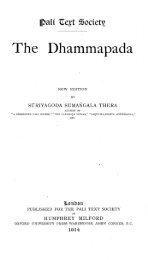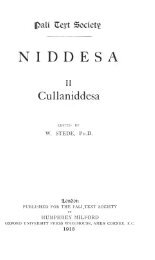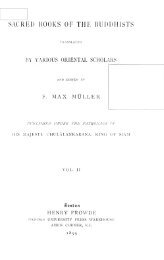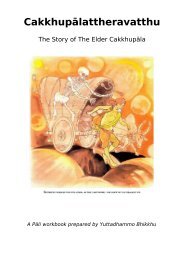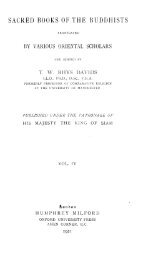Vessantara-Jataka in Pali and English - MyWebSpace
Vessantara-Jataka in Pali and English - MyWebSpace
Vessantara-Jataka in Pali and English - MyWebSpace
You also want an ePaper? Increase the reach of your titles
YUMPU automatically turns print PDFs into web optimized ePapers that Google loves.
Translation 521 <strong>Vessantara</strong>-Jåtaka<br />
[Fausbøll, Jåtaka, vol. VI, p. 521]<br />
hies to the forest for wild roots <strong>and</strong> fruits, with which she fills her basket: at even<strong>in</strong>g she<br />
returns, lays the wild fruits <strong>in</strong> the cell, washes the children; then the four of them sit at the<br />
door of the cell <strong>and</strong> eat their fruits. Then Maddī takes her two 1 children, <strong>and</strong> retires to her<br />
own cell. Thus they lived <strong>in</strong> the recesses of the mounta<strong>in</strong> for seven months. 2<br />
Kumāra-paṅhaṁ<br />
The Children's Section 3<br />
At that time, <strong>in</strong> the k<strong>in</strong>gdom of Kāliṅga, <strong>and</strong> <strong>in</strong> a Brahm<strong>in</strong> village named Dunniviṭṭha,<br />
lived a brahm<strong>in</strong> Jūjaka. He by quest of alms hav<strong>in</strong>g obta<strong>in</strong>ed a hundred rupees deposited<br />
them with a certa<strong>in</strong> brahm<strong>in</strong> family, <strong>and</strong> went out to get more wealth. As he was long<br />
away, the family spent that money; the other came back <strong>and</strong> upbraided them, but they<br />
could not return the money, <strong>and</strong> so they gave him their daughter named Amittatāpanā. He<br />
took the maiden with him to Dunniviṭṭha, <strong>in</strong> Kāliṅga, <strong>and</strong> there dwelt. Amittatāpanā<br />
tended the brahm<strong>in</strong> well. Some other brahm<strong>in</strong>s, young men, see<strong>in</strong>g her dutifulness,<br />
reproached their own wives with it: "See how carefully she tends an old man, whilst you<br />
are careless of your young husb<strong>and</strong>s!" This made the wives resolve to drive her out of the<br />
village. So they would gather <strong>in</strong> crowds at the river side <strong>and</strong> everywhere else, revil<strong>in</strong>g<br />
her.<br />
Expla<strong>in</strong><strong>in</strong>g this, the Master said:<br />
"Once <strong>in</strong> Kāliṅga, Jūjaka a brahm<strong>in</strong> spent his life,<br />
Who had Amittatāpanā, quite a young girl, to wife.<br />
The women who with waterpots down to the river came<br />
Cried shame upon her, crowd<strong>in</strong>g up, <strong>and</strong> roundly cursed her name.<br />
"A "foe" <strong>in</strong>deed your mother was, a "foe" your father too, 4<br />
To let an old decrepit man wed a young wife like you.<br />
Your people brewed a secret plot, a bad, mean, cruel plan,<br />
To let a f<strong>in</strong>e young girl be wed to an old decrepit man.<br />
1 Read dva for deva.<br />
2 "Here ends the Enter<strong>in</strong>g <strong>in</strong>to the Forest (Vanappavesana-khaṇḍaṁ)."<br />
3<br />
[Title <strong>in</strong>serted from the scholiast. -- jrb]<br />
4 A pun on amitto, "foe."



